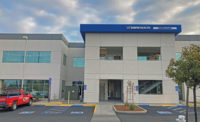Wilson Electric has been working in the Southwest since its founding in 1968, developing a strong presence in the region. Today, the specialty contractor boasts an above-average EMR of 0.49 as well as revenue that consistently places the firm in the top 10 on ENR Southwest’s annual Top Specialty Contractors survey. In the field, the firm recently worked on such high-profile projects in the Phoenix area as Marina Heights as well as some under-the-radar work in Sierra Vista, Ariz., for Fort Huachuca.
Jason Schroeder, project manager, DPR Construction, says the safe, timely and collaborative work the firm has been performing on the University of Arizona Bioscience Research Laboratories in Tucson has reinforced his appreciation of working with Wilson Electric.
“They are the A-plus contractor. I wish everybody was like them,” he says.
ENR editors have selected the firm as the 2017 Southwest Specialty Contractor of the Year.
Wes McClure, the firm’s CEO, attributes its success over the past two decades to a philosophical devotion to growth in quality, safety, performance and partnerships.
“If you are not growing, you are not going anywhere,” McClure says. “We are going to get better. We are not going to stagnate in anything we do.”
Past to the Future
Although Wilson Electric has been in business for almost 50 years, its current incarnation can be traced back to 2003, when McClure led a buyback three years after the company was sold in the Encompass Services Corp. national rollup, he says.
McClure has been with Wilson Electric since 1990, first leading the Sierra Vista, Ariz., operations and later overseeing Phoenix work. He led the team that performed the electric work on Bank One Ballpark, now known as Chase Field. But after 9/11, revenue dipped and Encompass Services Corp. looked to shed debt.
“Wes McClure told us that if we stuck together, we would be successful,” says Todd Klimas, COO.
From the beginning of the new ownership led by McClure, the company was set on an employee stock ownership plan. Today, the ESOP still owns 43 percent of the firm, McClure says, adding the firm carries no debt.
“As we grow as a company and are able to have success, we expect to share it for all of our employees,” McClure says.
Klimas says of the firm’s 750 workers, 200 have been hired over the past two years. The firm has offices in Arizona in Tempe, Tucson, Sierra Vista and Prescott Valley as well as in Albuquerque, N.M., and Salt Lake City.
Safety, Partnership Success
The partnership aspect to employee ownership was the foundation on which McClure based Wilson Electric after purchasing the firm. But it became much more, McClure says, driving the firm to embrace less confrontational and more collaborative relationships with general contractors and suppliers.
“There was a time in construction where everyone was at odds: general contractor versus subcontractor,” McClure says. “That philosophy doesn’t work between us and general contractors or between us and suppliers. We talk to them and tell them we expect them to make a profit and if we do well, you can do well.”
He says the new approach of just doing what needs to be done to make a project successful was an approach that took some by surprise. For example, Wilson Electric does not argue over change orders with general contractors and does not press suppliers to trim costs and get materials on site faster. He says that firms that understand the approach and have adapted to the new ways are today’s most successful firms.
“We don’t go out and buy the cheapest items but look for the best value proposition,” Klimas says.
Gerren Echols, project executive at Sundt, agrees, adding that Wilson “understands the scope and deliverables. They are self-motivated and independent but not to a fault.”
Training for Tomorrow
Although the firm’s ownership has less than two decades at the helm, the Wilson Electric of today continues to support and utilize training programs to elevate the skill set of tomorrow’s leaders.
“Training is nothing new for us. We’ve been doing that since we started,” McClure says.
Wilson Electric was integral in setting up the Arizona Builders Alliance training program for electricians in the early 1980s. Mark Minter, executive director of the Arizona Builders Alliance, says the four-year training program currently has about 300 students from 20 to 25 firms.
“Wilson Electric is still one of our biggest participants in the program,” Minter says. “They have had probably a couple of hundred people graduate from the programs over the years.”
Klimas says proper training and support translates into longer tenured and better prepared field staff, adding that the firm’s foremen and superintendents have an average of more than 13 years of experience.
Additionally, as former field workers, both McClure and Klimas can relate to field challenges.
“Construction is a tough job,” Klimas says.
Common experience also helps when striving for an above-average safety record.
“It is not as simple as having a safety cop. You have to get everyone, personally, to buy in,” he says.
True to the philosophy of constant improvement, Klimas says the firm is not content with a 0.49 EMR. He says applying prefabrication to more spots on more jobs is one way the firm can improve on its safety record while acknowledging it is not a cure-all.
“Prefabrication absolutely changes job to job and region to region. It would be a mistake to draw too much of a line around it. We take each job on its own merits and plan for the best way to do the job,” Klimas says.









Post a comment to this article
Report Abusive Comment